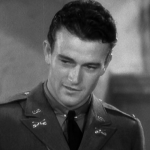 |
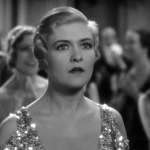 |
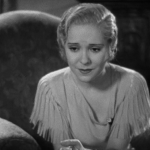 |
| Lt. Bob Denton … John Wayne |
Evelyn … Laura La Plante |
Bonnie … June Clyde |
Proof That It’s Pre-Code
- In a men’s locker room, you sometimes see men’s hinders lurking in the background.
- A Mexican prostitute keeps accusing a jerkwad of being a “Poco hombre!” which probably ain’t super risque, but funny nonetheless. She’s also ‘completely lit’ and drinking straight from the bottle.
Arizona: A Dusty Tale
John Wayne was still struggling in 1931. A year after his first starring role in the flop The Big Trail and eight years before hitting it big in Stagecoach, he was still assigned to lead roles though in less-than-prestigious pictures. And less-than-prestigious is probably the nicest thing you can call Arizona.
Shedding his cowboy hat for a military uniform, Wayne is Lieutenant Bob Denton, a military cadet with a roving eye. He’s dated Evelyn for the last two years, but he’s graduating soon and making his way to Arizona to be the right hand man of his mentor, Colonel Bonham (Forrest Stanley). As soon as she hints as a wedding ring, he breaks it off with her.
The problem with this scene, one of the earliest in the picture, is twofold. We’ve already been told that Bob is a fan of the ladies and that they all have ‘an understanding’. Why he has this reputation after two years of going steady is puzzling enough, but in the course of the scene Bob sees a picture of Evelyn’s sister and, to say nothing of Wayne’s acting talent, pretty much starts to drool all over it.
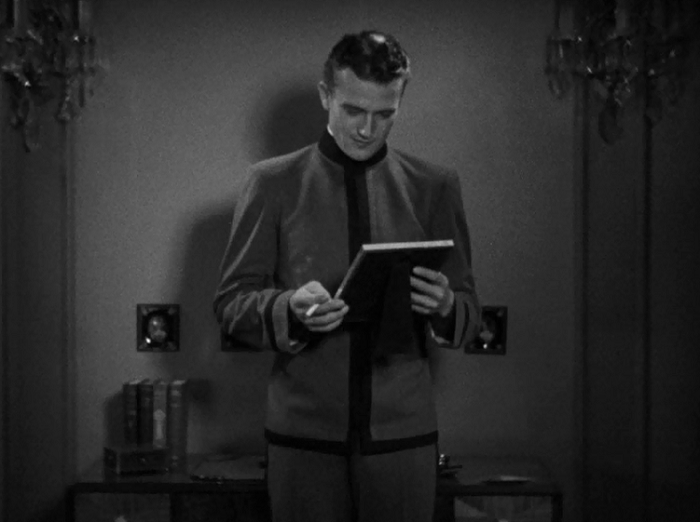
“Aw, yeah, baby, I like the shape of your frame.”
It makes Bob into a leering slime ball and Evelyn into thick numbskull, which are not the most appealing characters to follow. Don’t worry, though, it gets sillier.
Evelyn, feeling pretty angry, especially when Bob shows up to a party later that night with a different woman, decides to get revenge in the most ludicrous way you can imagine: she seduces and marries Colonel Benham. While most of us nowadays would probably see this as a little crazy, Evelyn just laughs maniacally while she waits for Bob to arrive at his new post in the Arizona desert to discover her joke.
The entire movie is a baffling observation of Evelyn whose endgame is never clear or even sensible (actress La Plante is the star of the movie for the record, billed above Wayne). She’s a sociopath, through and through, and by the time she gets to the film’s end, she’s ruined the lives of three other people out of nothing but short sighted selfishness.
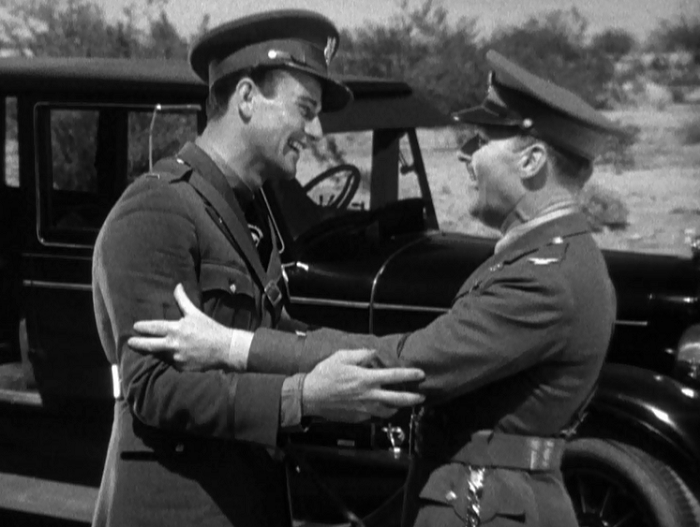
“It’s great being great friends! Just great!”
For example, while she does get to smirk and prance in front of Denton as he now must kowtow to his friend and mentor’s new wife, she still feels unsatisfied. In a fit of poor planning, she’s also brought her spunky kid sister, Bonnie, along for the ride. Staying true to that copious drool he paraded around earlier, Bob sets about seducing Bonnie while Evelyn gets caught up in trying to foil Bob’s happiness at every turn.
Spoilers.
This conflict peaks when Evelyn decides to rip her dress and fake to the Colonel that Bob tried to rape her. The rape gets a couple of polite metaphors (yes, it is even referred to as ‘making love’, the 1930s catch-all for naughtiness), and everyone is absolutely aghast.
Learning that Bob and her sister were secretly married a few months earlier, Evelyn realizes that Bob really does love Bonnie, and reluctantly confesses her misdeed to her husband. Relieved to find that his friend wasn’t really a rapist and that his wife was simply a mentally unstable whack, he sends Bob and Bonnie to San Francisco and forgives his wife. For some reason.
End Spoilers.
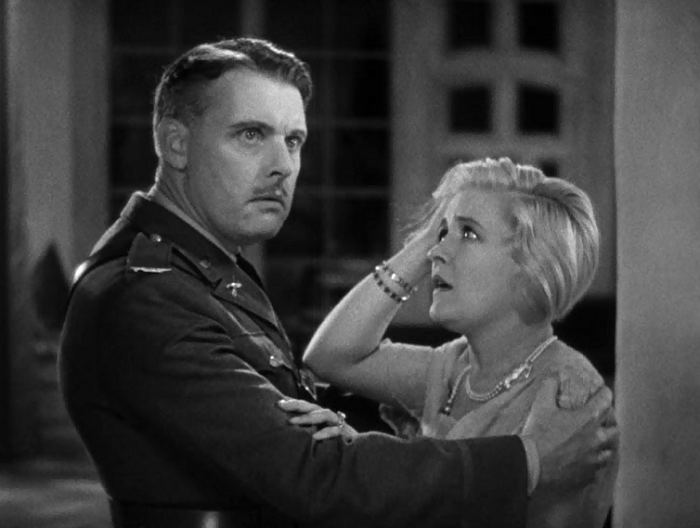
“I’m sure I’ll be able to get over this meticulous deception and the fact that my marriage was a complete fabrication in five, ten minutes tops!”
Arizona is an extremely contrived melodrama which features ‘interesting moments’ rather than ‘redeeming features’. Bob is a pervert until he’s redeemed by Bonnie’s love, or so we’re led to believe. Evelyn is a schemer who comes to regret all of her lies until she doesn’t. Only the Colonel comes across with any sense of decency or warmth, but his ability to forgive and move on smacks of screenwriter contrivance.
What’s the moral of Arizona? I guess that human pettiness has no bounds, that honor means squat, and not to mess around or you might piss off the wrong woman. Men are idiots, women are crazy. If you want to improve on the experience of Arizona in 1/100th of the time, I recommend just watching a laundry detergent commercial.
Gallery
Trivia & Links
- This one was reviewed in the New York Times (second review down) as Men Are Like That. The reviewer also surmises that, “it is hardly a film that can be characterized as good entertainment.”
- This piece over on Immortal Ephemera discusses where Wayne’s career was around the time that this was made… and it’s none too rosy.
- TCMDB notes that there were two previous versions of this movie, one from 1913 and the other from 1918 with Douglas Fairbanks.
Awards, Accolades & Availability
- This film is part of the Columbia pre-Code collection, along with Virtue, Three Wise Girls, Ten Cents a Danceand Shopworn, and the set isavailable on Amazon and can be rented from Classicflix.
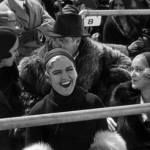 |
Comment below or join our email subscription list on the sidebar!Home | All of Our Reviews | What is Pre-Code? |
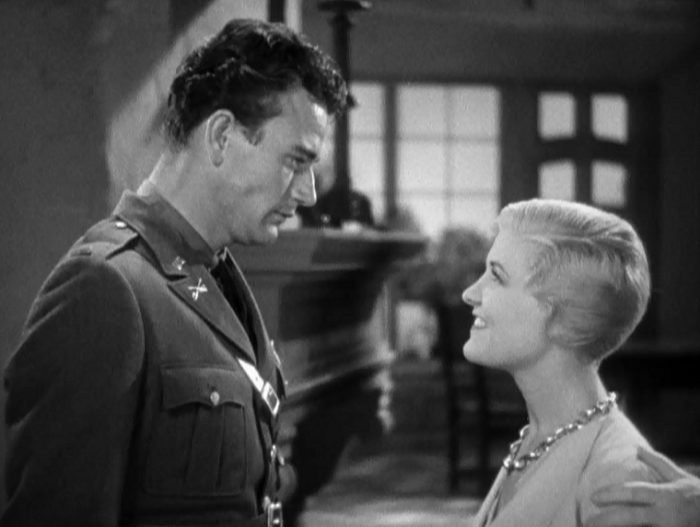




7 Comments
Kevin Scott Measimer · December 2, 2013 at 8:01 am
Interesting. I can avoid this one. Probably would have anyway. Not a John Wayne fan but I know some of his westerns are classics so I would give those a look.
Danny · December 2, 2013 at 8:35 am
My impression of Wayne’s career is that you can start with The Big Trail (1930) and then skip directly to Stagecoach (1939) and you’re just doing yourself a favor. Wayne’s work with John Ford in the 40s, 50s, and 60s is great, but in the 30s he was still struggling and stuck in a lot of low budget cowboy movies.
Judy · December 4, 2013 at 1:07 am
I saw ‘The Big Trail’ on TV a little while back and thought it was great – amazing to see widescreen from 1930, though I believe that was the main reason it flopped, as cinemas didn’t have the technology to show it in that form. A shame that Wayne spent so many years in the wilderness after that – this one sounds pretty bad from your review, though I’d still be interested to see it! I have seen another of his non-Western 1930s films, ‘His Private Secretary’, and that isn’t much good either.
Danny · December 4, 2013 at 10:02 am
Ditto on His Private Secretary. I will say that I think the decade of obscurity probably gave Wayne time to shed many of his more wooden acting tendencies, but I may be alone on that.
Kenneth Lee Jones · May 27, 2014 at 11:47 pm
I just saw the beginning of this on GetTV. I knew it was a 1931 early “talkie” based on the opening announcement. Was shocked to see several gluts on full display in a shower scene. At that point, I knew something was “pre-code”.
Danny · May 29, 2014 at 1:38 pm
I didn’t notice the bare hinders until I started screen capping, but, yes, there’s definitely a blatant loving affection for the male body going on in the background.
Nadelia · December 10, 2015 at 2:14 am
I enjoyed this movie; the football game at the beginning was a riot. John plunking the ball over the goal post to win the big game, boys in the shower room, et al, John looked a little old to be a cadet, but that just added to the movie’s charm.
Comments are closed.